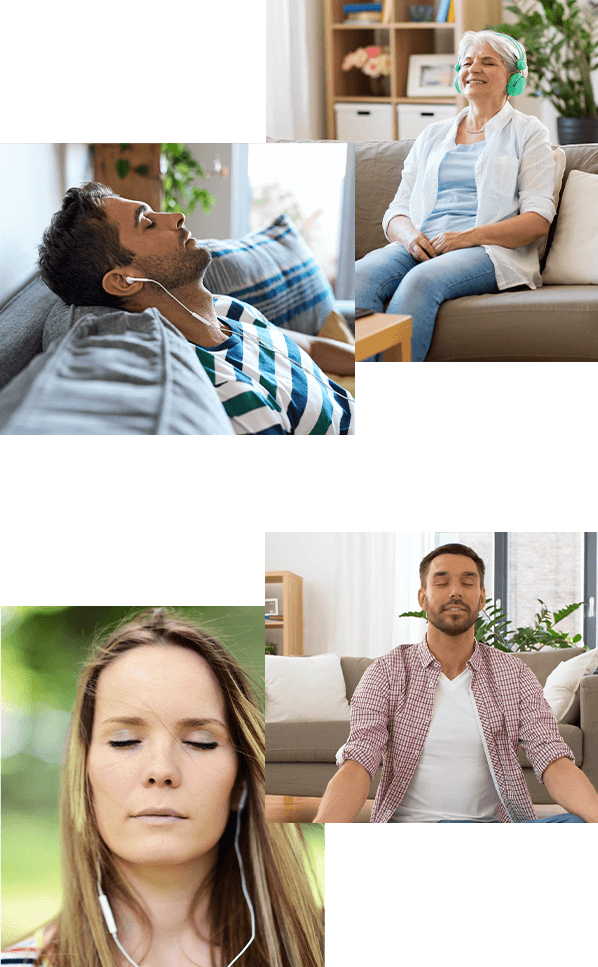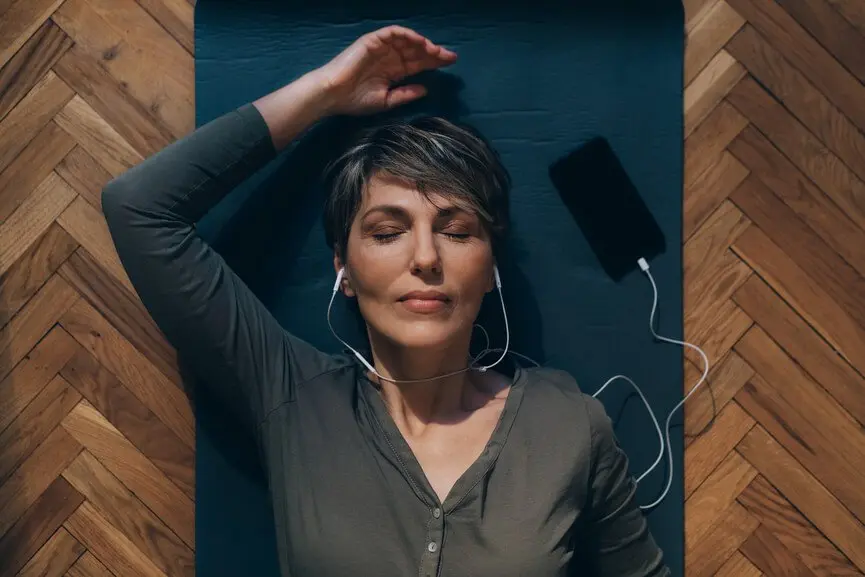400+ Free Meditation Practices
See our growing library of free guided meditation practices, courses, and daily meditation practices.


If you want to learn to meditate, it doesn’t require any equipment, any incense, or any chanting. You also don’t need to sit in a lotus position with your arms stretched out and fingers touching.
A simple guided meditation can take you from all your preconceived notions of meditation, to a useful tool in your life toolbox that can help you manage stress, better understand yourself, and be a little happier in your day-to-day life.
The typical answer to “why meditate?” can come across as a sales pitches. When we see other people answer this question, they have a tendency to be hyperbolic, and they tend to oversell the benefits or reasons to learn to meditate.
Ultimately, if you’ve come to this website to learn to meditate, or if you’ve been thinking about learning or trying to meditate, that should be reason enough for yourself. Part of the reason to learn to meditate, is to see how it can work for you.
You shouldn’t need to convince yourself to simply try it. It’s not as if you’re making a massive financial decision, or it’s a life or death decision (although, meditation can be life changing – and yes, we know that seems hyperbolic after just talking about how people can be hyperbolic about meditation).
Meditation is very accessible (anyone can learn it) and very simple (but not easy). It doesn’t hurt to try a guided meditation session and see if it’s a good fit for you.
To learn to meditate, you just need your mind. However, there’s a caveat. If you’re going to learn to meditate, give yourself a break and be patient. At the same time, don’t try to convince yourself it’s doing anything if it’s not, especially only after 1 session. When we meditate, we’re not trying to make anything happen. It’s non-judgemental awareness of the present moment.
But we still haven’t answered the question “why meditate?”. Why even bother taking the time to sit still and quietly for 5 or 10 minutes? (There’s a lot more to it than that but just bear with us.)
Well, let’s look at what some of the greatest philosophers have said.
“The unexamined life is not worth living.” Socrates
There’s a lot of truth to this. Meditation is one of the ways we can set aside time to not only become introspective of ourselves and our lives, but to truly understand just what the heck is going on in our minds.
“If you want to understand your mind, sit down and observe it.” Anagarika Sri Munindra
With that, meditation, specifically mindfulness meditation, is how we observe the mind. It’s how we begin to understand our mind, how it works, what are our common thought patterns, trappings, worries, and judgements.
It’s also where we can begin to distance ourselves from our thoughts. The biggest revelation you will have while trying to learn to meditate is that you are not your thoughts or your thinking.
“It’s not things that upset us, it’s our judgement about things.” Epictetus
That’s the key to living a better life. An examined life. Understanding that it’s not actually what’s happening to us or even our thinking that causes our suffering. It’s our judgement of those things.
“We suffer more often in imagination than in reality.” Seneca
In addition, our minds can make rough times even more rough. Heck, it even has the tendency to suck the fun out of times in our life when we’re happy. Thoughts can suddenly creep in, like guilt or worries, and take us out of the enjoyable moment we’re having.
“If you are depressed you are living in the past. If you are anxious you are living in the future. If you are at peace you are living in the present.” Lao Tzu
Speaking of taking us out of the present moment, practicing meditation teaches us to live more presently. That’s part of the reason why mindfulness meditation has the word mindfulness in it! It’s about trying to be more mindful of the now. The past has already happened and can’t be changed. The future isn’t a real thing and can’t be predicted. All we have that we know, can control, and predict, is the now.
“ou have power over your mind — not outside events. Realize this, and you will find strength.” Marcus Aurelius
And this is ultimately why we should learn to meditate. To finally have power over our mind. Mastery of our minds is the most practical and useful skill anyone can have because at the end of the day, that’s really all that we can control. It affects our lives, our loved ones, how we perceive events in the world, our success, our health.
We can’t control external events. We can’t control what people think about us. We can’t control how long we’ll live. We can control our thoughts.
This is the point that is possible to reach with enough practice and meditation. However, it’s not easy and it’s never perfect. Despite having 14 years of experience meditating, even I struggle to maintain power over my mind, its desires, its fears, its thoughts, and my judgement of these thoughts.
There is a lot of scientific evidence and anecdotal evidence for the numerous benefits of meditation. Here are just some of the notable ones that most people will find applicable to their lives:
Many people struggle with insomnia or simply being able to consistently get a full nights rest. There are guided meditations that can help create the conditions for deep and restful sleep.
Worries, stress, obsessive behavior, and anxious thoughts are all things that can cause a lot of suffering if left unchecked. Meditation for anxiety can help us become aware of these anxious thoughts and practice managing them better.
There is a form of meditation called Loving-Kindness that offers immediate benefits such as a state of happiness. However, practicing anything of meditation over the long term has the added benefit of simply making one happier overall.
Whether that state of overall happiness comes from the way meditation improves the mood, or the way it opens the way for more gratitude, a regular practice is good for happiness.
Meditation can make one more mindful of their impulses and emotional reactivity. It’s very easy to follow and hold on to a feeling when it arises. With meditation, it can train you to let go of emotions a lot easier, or at least, not allow them to control your actions, in particular with angry outbursts and tantrums.
A craving is a thought like any other thought that enters the mind. Mindfulness meditation can help us learn how to observe thoughts, experience the feelings they bring with them but allow them to pass instead of following them and acting on them. Guided meditations for cravings teach this.
Mindfulness meditation can train the mind to be better disciplined when it comes to distractions. Often when our minds wander, it starts with a thought. All it takes is to follow that thought, to completely forget what we were even trying to focus on in the first place.
Meditation can be like going to the gym for the mind. Training the focus muscle to get better at noticing distractions and letting them go.
See our growing library of free guided meditation practices, courses, and daily meditation practices.
